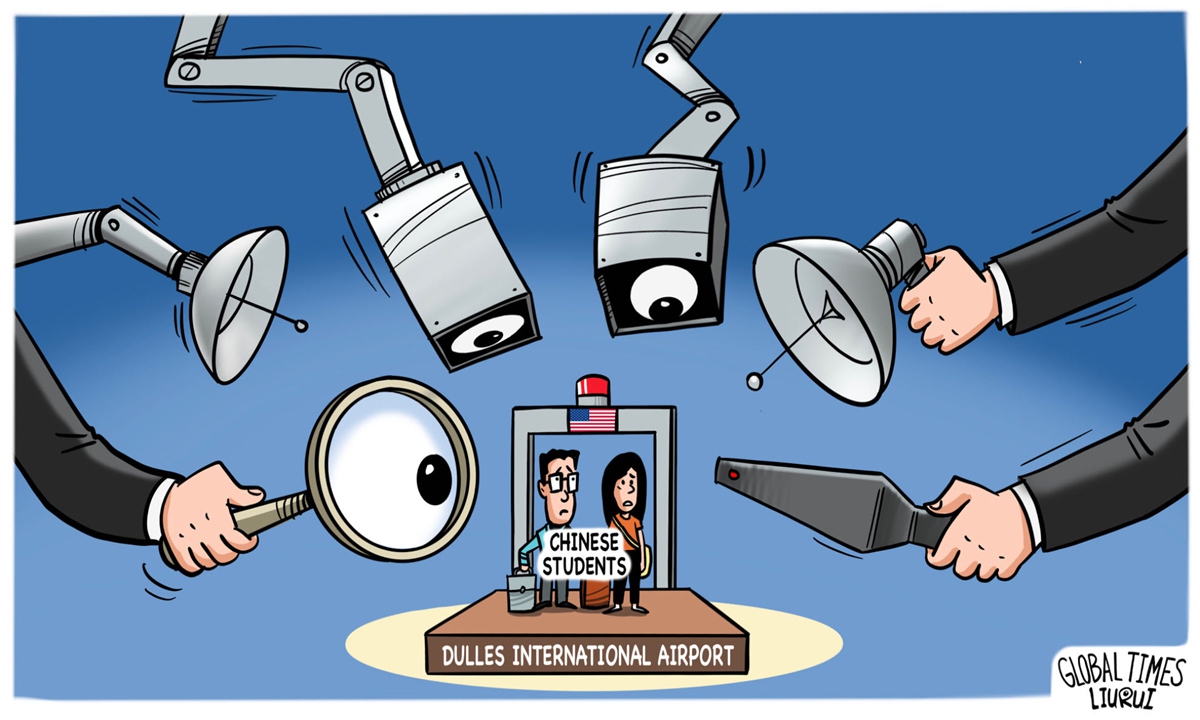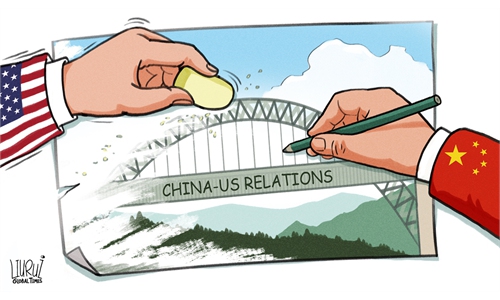
Illustration: Liu Rui/GT
In recent years, incidents of unjustifiable harassment, interrogation and deportation of Chinese students and scholars by US border control personnel have occurred more rudely and frequently. The US, guided by populism and xenophobia, is now clearly destroying its own soft power and appeal to the world.
According to a spokesperson for the Chinese embassy in the US on Monday, nearly 300 Chinese citizens have been deported by the US since July 2021, including more than 70 Chinese students with legal and valid materials. Recently, more Chinese students and scholars were interrogated and forcibly deported when entering the US at the Washington Dulles Airport and the Dallas Airport, and the US law enforcement personnel reportedly said it was because of bad US-China relations when asked for the reasons for their deportation.
These latest cases once again prove that the so-called "national security" is nothing but an excuse for the US to attack China. Obviously, the US side attempts to express its unwelcome stance toward Chinese citizens through deportation. It also hypes up this topic via media to whip up public opinion for the "China threat" theory.
If one looks at the overblown skepticism in the US toward Chinese students and scholars, one will find that the mentality of some US politicians is twisted. The pan-securitization of personnel exchanges with China clearly reflects the growing anxiety and lack of confidence in the US. The US believes that a "closed-door policy" can protect its advancement like a glass cover, and neurotically thinking that Chinese people who enter the US will "steal" something from the US or pose some "danger" to it. This is a typical manifestation of disequilibrium and insecurity and definitely not the normal mentality of a superpower.
However, it is simply a self-soothing behavior for the US. These measures against Chinese students and scholars perhaps work like sleeping pills that help American politicians hypnotize themselves when they are anxious. Under the manipulation of some US politicians, academic and educational exchanges and cooperation between China and the US are being politicized and instrumentalized. If this momentum is not stopped in time, this topic could be maliciously exerted even more by anti-China forces in the US in exchange for their selfish political gains.
Restricting the entry of Chinese students and scholars into the US and exacerbating the atmosphere of academic exchanges between the two countries will bring no benefit to the US. Instead, it will only result in a blow to its own development.
On the one hand, since Chinese students have been a major source of revenue for many US universities and colleges, more harassment from US authorities will significantly reduce the interest of Chinese students to study in the US. This is likely to have an impact on the funding for some American universities and educational institutions. On the other hand, the US will undermine its own scientific research environment and innovation vitality if it loses those talents from developing countries, including China. More importantly, the US is destroying its self-boasted core value of "diversity and freedom" by taking such xenophobic and hegemonic measures against Chinese citizens, ultimately undermining its image as a so-called beacon of freedom.
On April 2, Chinese President Xi Jinping and US President Joe Biden held a phone talk, in which the two sides agreed to further expand people-to-people exchanges. The groundless interrogation and deportation of Chinese citizens by the US not only runs counter to President Biden's promise and the consensus between the two heads of state, but also seriously hampers people-to-people exchanges between the two countries.
Li Haidong, a professor at the China Foreign Affairs University, pointed out that, the inconsistency between Biden's words and some US authorities' deeds is totally a disregard for the authority of the US president. The US government should truly implement Biden's promises to China, rather than paying lip service, Li added.
Unlike the US' constant suppression and empty words, China has taken a set of measures to facilitate personnel exchanges between the two countries. In November 2023, President Xi announced in San Francisco that China is ready to "invite 50,000 young Americans to China on exchange and study programs in the next five years" in order to enhance exchanges between the two peoples.
This demonstrates that China has a more welcoming attitude and a more open mind toward US students; it is confident enough not to be influenced by the absurd public opinion of the US. The US should also gain some confidence and give up its victim mentality.
The restrictions on Chinese citizens entering the US border will only cede the opportunity to other countries that encourage people-to-people exchanges with China, while increasing US' self-isolation. Without China, the largest developing market, the advancement of American research and education will float in the air and America's status as the global hub of cultural exchange will be discredited by the border measures. This will be a path to self-destruction for the US, rather than a way to protect its strengths.

